Laser Gum Surgery in Denver
Your gums play an important role in oral health. Gums act as a barrier, protecting your teeth from bacteria and other harmful substances. If your gums become damaged from disease, they can no longer perform their role. It’s estimated that almost half of all adults in the United States have some form of gum disease.
While there are traditional treatments for periodontal disease, laser treatment for gum disease is becoming an increasingly popular treatment option. To learn more about the services we offer or to schedule a consultation, call (303) 321-5656 or complete the online booking form.
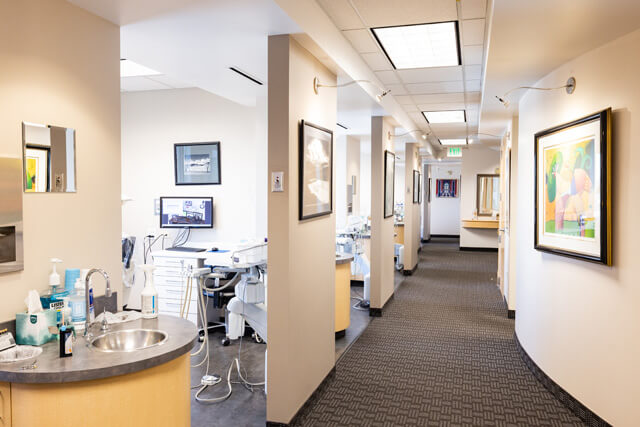
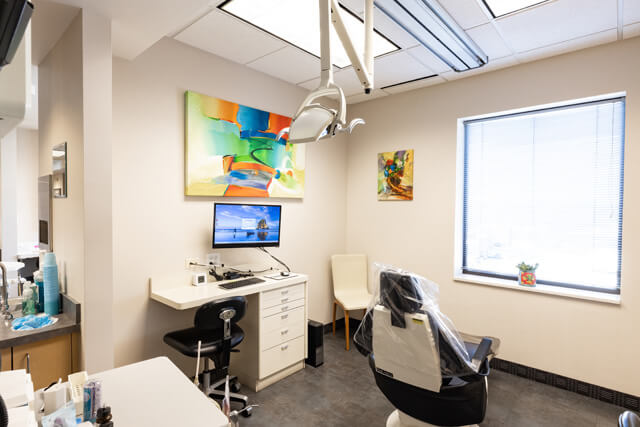
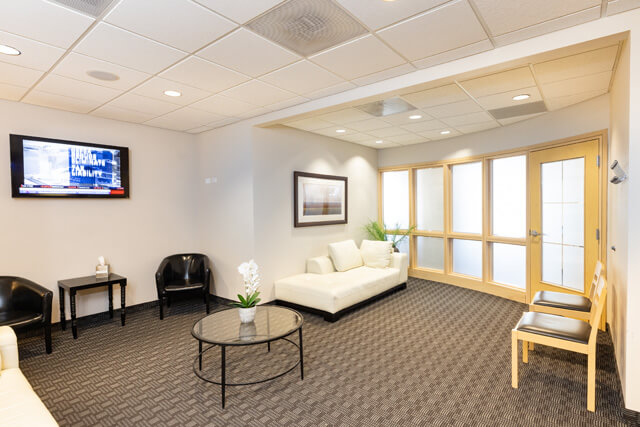
What is Laser Gum Treatment?
Laser gum treatment, also called laser periodontal therapy or laser gingival contouring, is a type of surgery that uses wavelengths of laser light to remove small amounts of gum tissue. Using this laser technology, we can treat gum disease and improve your gummy smile.
Periodontal Disease
Periodontal disease is an infection of the gums that can destroy the tissue and bone that support your teeth. Periodontal disease can lead to tooth loss and other health complications, such as stroke and heart disease, if left untreated. Periodontal disease may also affect pregnancy outcomes, and studies show that preventive dental care during pregnancy is important.
Laser Gum Treatment vs. Traditional Gum Surgery
The traditional oral surgery methods of treating gum disease involve cutting away the diseased tissue with a scalpel and then sewing the healthy tissue back together. This can be a painful and invasive procedure.
Laser treatment is a much less invasive surgery, and this method preserves healthy gum tissue and reduces the risk of infection. Laser treatment can be performed in one or two visits to your dentist, and there is no need for stitches. Laser gum treatment can also treat periodontal pockets of infected tissue and harmful bacteria, a common complication of gum disease.
Types of Laser Treatment Therapy
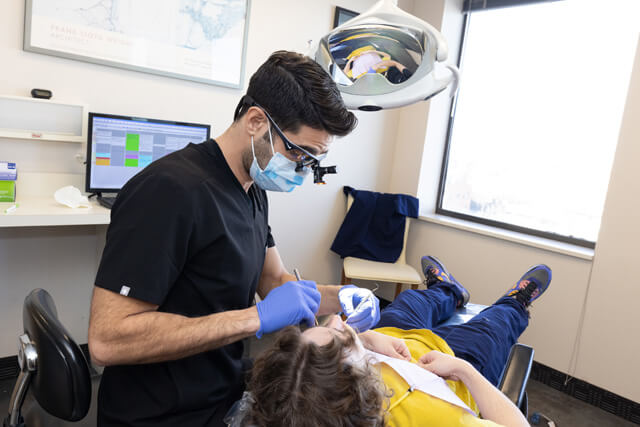
There are two types of laser gum treatment: soft tissue diode laser and hard tissue erbium laser.
- The diode laser is commonly used for soft tissue procedures, such as laser gum treatments, wound healing, and uncovering impacted or partially erupted teeth. This laser emits wavelengths of light that are absorbed by water.
- The erbium laser is commonly used for hard-tissue procedures, such as laser gum contouring, restorative removal, and cavity preparation. This laser emits wavelengths of light that are absorbed by minerals.
Gum Recontouring
In addition to treating gum disease, dental laser treatment can also be used for cosmetic purposes. Some people have excessive gum tissue covering their teeth, making their smiles appear “gummy.” Laser treatment can be used to remove excess gum tissue, as well as to reshape and contour the gums, and this can give you a more aesthetically pleasing, beautiful smile.
Gum Grafting Procedure
If you are suffering from gum recession, gingival (gum) grafting may be necessary. Recession is when the gum tissue that surrounds the tooth pulls away or recedes. During the procedure, a small piece of gum tissue is taken from another area of the mouth and grafted onto the receded area. This can help to stop the progression of gum recession and prevent further damage to the teeth.
How The Procedure Works
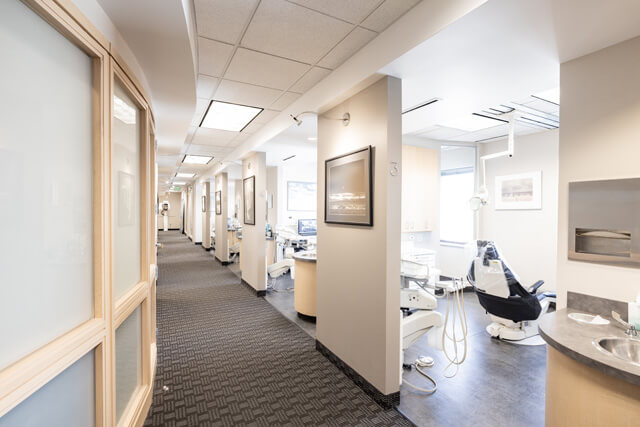
Laser gum treatment is performed as an outpatient procedure, meaning you can go home the same day as your procedure.
- Before the procedure, your dentist will numb your gums with a local anesthetic, and you may also be given sedation to help you relax.
- The dentist will use a laser during the procedure to remove the diseased tissue from your gums. The laser energy will also seal off any blood vessels, which can help to reduce bleeding and swelling.
- After the procedure, your gums will be sore and tender. Your dentist will give you pain medication to help relieve any discomfort. You may also be given antibiotics to help prevent infection.
Recovery
Most people recover from laser gum treatment within a few days. Your recovery time will depend on the treatment and the wavelength used.
Here are some things you can do to help your recovery and help the healing process.
- You should take it easy for the first 24 hours after your procedure. Avoid strenuous activity and hot drinks. You should also avoid drinking alcohol for at least 24 hours.
- It’s normal for your gums to bleed and ooze following the procedure. If excess bleeding occurs during the recovery process, you should contact your dentist.
- You may use a salt rinse after the surgery to help with any pain and swelling. Simply mix 1 teaspoon of salt in a glass of warm water and rinse your mouth for 30 seconds. Do not forcefully spit the water out, as this can irritate your gums.
- You should avoid smoking for at least 24 hours after laser gum treatment, as this can delay healing.
- You will need to eat a soft diet for the first few days following your procedure to let your gums heal. Avoid hard, crunchy, or sticky foods that could irritate your gums. Foods like mashed potatoes, smoothies, soup, and Jello are good choices.
- Maintaining good oral hygiene habits is important after surgery. After the treatment, you will have very small clots on your gums, which mustn’t fall off. You can gently brush your teeth with a soft toothbrush, avoiding the gum line.
- It’s essential to keep your follow-up appointments with your dentist. They will need to check on your healing and ensure the laser treatment was successful.
Periodontal Maintenance Visit
After laser gum treatment, you will need to have regular periodontal maintenance visits. These visits are important to help prevent the recurrence of periodontal disease that cause abscesses and loss of teeth. During these visits, your dentist will remove any tartar that has built up on your teeth and gums. They will also check for any signs of gum disease.
Are There Any Risks From Laser Gum Treatment?
Laser gum treatment is considered a safe and effective procedure. However, as with any medical procedure, there are some risks associated with laser gum treatment.
These risks can include the following:
- Bleeding
- Infection
- Pain
- Swelling
- Bruising
If you have any concerns or questions before the procedure, speak with your dentist. They can answer any questions you may have and help put your mind at ease.
Restoring Healthy Smiles
Laser gum treatment for gum disease and cosmetic purposes is safe and effective. At Dewitt Dental Associates, we employ laser dentistry as one of several advanced procedures. We want all of our patients to enjoy a comfortable experience free from dental anxiety.
We utilize innovative technologies like soft-tissue lasers to assist in your oral health, as well as caring and gentle treatment from our staff. Depending on your needs, you may be referred to a periodontist or specialist that specializes in laser treatment.
If you live in Denver, Englewood, Cherry Creek, or the surrounding areas and are interested in learning more about our laser dentistry services, call (303) 321-5656 or complete the online booking form. We want to be your dentist in Denver.
FAQ
Does Laser Gum Surgery Hurt?
No, laser gum surgery is usually painless. There may be some discomfort after the procedure, but you can treat this with over-the-counter pain medication.
How Long Does Laser Gum Surgery Take?
The laser gum surgery procedure usually takes about 30 minutes to an hour.
Is Laser Gum Surgery Covered by Insurance?
Laser gum surgery is usually considered a cosmetic procedure and is not often covered by insurance. However, if your laser gum surgery is being done to treat periodontal disease, your insurance may cover some or all of the cost.
How Long Does It Take To Recover From Laser Gum Surgery?
Most people recover from laser gum surgery within a few days. You may have some soreness and tenderness in your gums, but you can treat this with over-the-counter pain medication.
